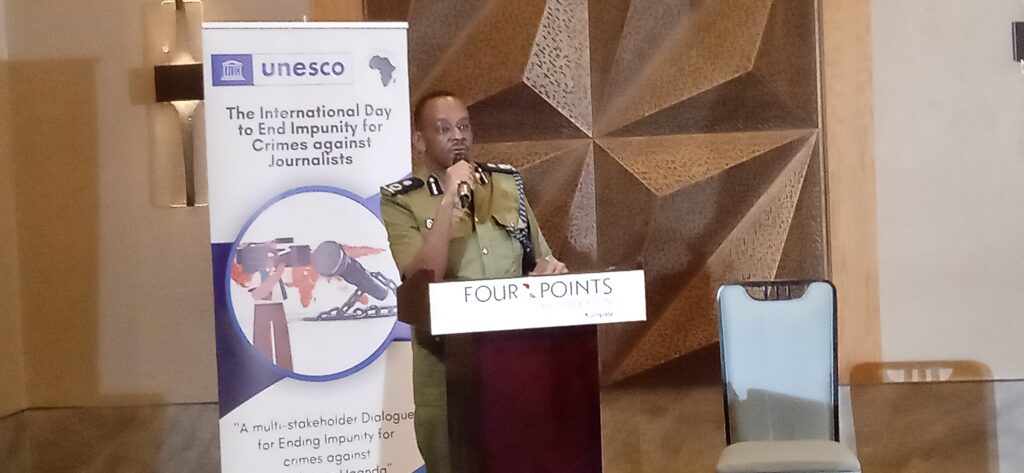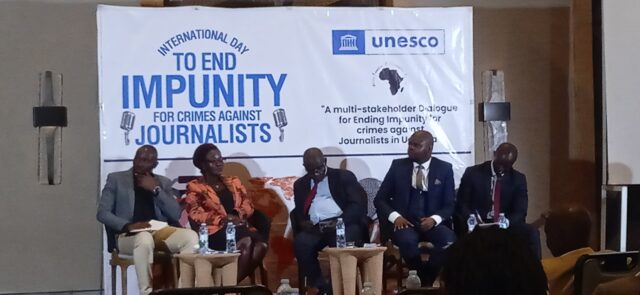
After joining the global community to commemorate the International Day to End Impunity for Crimes
Against Journalists, various stakeholders continue the fight to promote press freedom.”
The Africa Freedom of Information Centre (AFIC), UNESCO’s Regional Office for Eastern Africa, and the
Office of the United Nations High Commissioner for Human Rights (OHCHR) engaged stakeholders in
discussions on ending violations against journalists as part of efforts to promote press freedom. This
took place at a multi-stakeholder dialogue on ending impunity for crimes against journalists in Uganda,
held at the Four Points Sheraton Hotel on November 4, 2024.
According to research conducted by AFIC in 2020/2021, they found that during election periods, the rate
of press freedom violations and attacks on journalists, along with impunity and lack of accountability, is
alarmingly high. This prompted AFIC to create a platform for engaging on these issues, aiming to ensure
accountability for violations and crimes committed against journalists. The goal is to ensure that the
forthcoming elections will be free and fair, with journalists able to work independently, without fear of
victimization, harassment, torture, or the confiscation of their equipment.
During the dialogue, the Executive Director of AFIC, Gilbert Sendugwa, revealed that there is a strong
connection between the right to information and press freedom. He noted that when the press is free, it
can provide citizens with crucial information, enabling them to engage with the government on policies,
actions, and programs from an informed perspective, as this empowers citizens to hold the government
and duty bearers accountable.
Gilbert stressed that AFIC has been addressing these issues through various initiatives. For example, in
2021, they conducted election violence monitoring in Uganda, where they found that journalists were
among the top four victims of violence during the elections.
They also found that the Uganda Police, military groups, and Kanyamas established by various political
factions were the leading perpetrators. This highlighted the importance of this conversation, especially
as the country approaches the 2026 general elections. The goal is to raise awareness and mobilize
goodwill among all stakeholders to create a free environment where everyone, including journalists, can
work freely, and where duty bearers are held accountable for the actions of perpetrators.
The Deputy Secretary General of the UNESCO National Commission, Dr. Dominic Mundrugo Ogo Ali,
noted that journalists in Uganda have consistently faced mistreatment, highlighting the need for
stakeholders to unite in the effort to end impunity.”
He revealed UNESCO’s recommendations, which urge Uganda to take measures to protect citizens’
rights, decriminalize defamation by moving it to civil courts, investigate cases involving journalists, and
implement a voluntary reporting mechanism, among other recommendations totaling over 270 in all.
One of the panelists, Miria Matembe, expressed dissatisfaction with the way Ugandans’ freedoms are
being violated and urged people to stand for the truth, regardless of the circumstances.
Matembe challenged journalists to understand the environment and challenges they work in, while
remaining focused on fulfilling their duties.”
During the discussion, journalist Ronald Mulondo from Vision Group testified that when he was assigned
to cover Robert Kyagulanyi’s camp during the 2021 general elections, police and security agents did not
spare journalists, subjecting them to beatings and the firing of tear gas. This significantly hindered their
work, while the Electoral Commission appeared to have no control over the situation.
The UMWA Board Chairperson, Charity Ahimbisibwe expressed concern over how attacks and torture
have driven female journalists away from newsrooms, forcing many to abandon their journalism careers
for other jobs.
The Head of Public Relations and Spokesperson for the Uganda Independent Electoral Commission,
Julius Mucunguzi, emphasized the need for everyone to work together to ensure peaceful elections. He
stressed the importance of sensitizing the public that elections are not a form of war, and that life can
return to normal after the elections.”
Assistant Inspector General of Police Charles Kataratambi urged journalists not to remain silent when
they are tortured or attacked by any police officer, but to come forward and report these incidents so
that perpetrators are held accountable.
Robert Sempala, the Executive director of Human Rights Network for Journalists in Uganda, noted that
since the UN Office of the High Commissioner for Human Rights left Uganda, a fundamental gap has
remained unaddressed by any government agency, despite the existence of the Uganda Human Rights
Commission. The UN used to encourage data compilation, produce annual reports disseminated
globally, and build the capacity of all those involved in the human rights sector—activities that are now
missing.
‘Without their presence, heading into 2026 is incomplete, as there is a high likelihood of an escalation in
human rights violations,’ he emphasized.”
Closing the dialogue, Programs Officer at the Uganda National Commission for UNESCO, Pauline Achola,
emphasized the need for greater efforts to harmonize the relationship between the police and
journalists. She also highlighted the importance of involving cultural and religious leaders, as their
support carries significant weight when advocating for journalists, and stressed the importance of
working together for peaceful coexistence during elections, ensuring that people can live in harmony.






